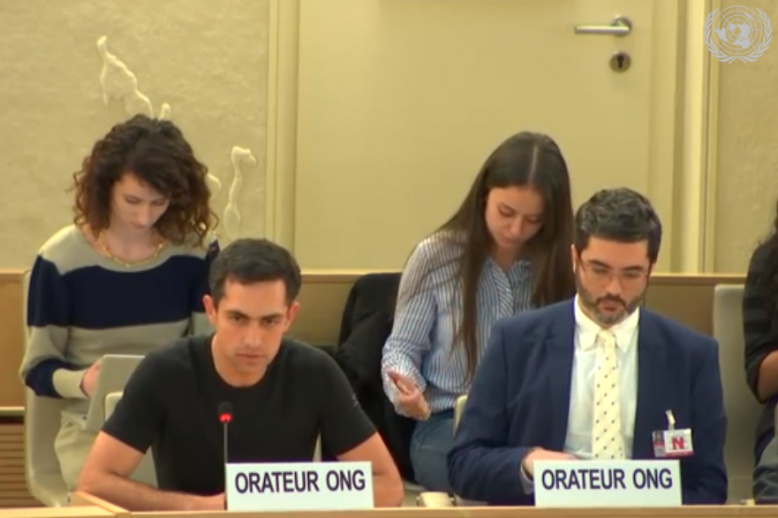At the UN Human Rights Council in Geneva today, emergency physician Dr Tarek Loubani addressed assembled states to share his testimony of being shot through the legs while providing medical care to wounded protesters taking part in the “Great March of Return” demonstrations. His testimony came as states discussed the full, 252-page report of the UN Commission of Inquiry established in May 2018 to investigate violations of international law in the context of the protests.
Dr Loubani’s case is highlighted in the report as a case of an attack on health workers, amid the Commission’s finding that it had “reasonable grounds to believe that Israeli snipers intentionally shot health workers, despite seeing that they were clearly marked as such.”
Dr Loubani’s statement to the Council is below, and the video can be viewed here (at 29m45s).

Thank you, Madam Vice President,
I am here with Dr. Mahmoud Matar on behalf of our colleagues from the hospitals of Gaza. I am an emergency physician in Canada and Gaza and associate professor of Medicine at Western University in Canada.
On 14 May 2018, I was at the protests delivering trauma care on the field. I saw only peaceful protesters, and none posed any threat to the soldiers. When protestors were shot, me and my team of medics would treat and evacuate them. Due to the blockade I did not have the materials or medics to care for my patients.
I was one of the 19 medics shot that day. I wish I could tell you I was in the midst of some chaos when it happened. I was not. The skies were clear, with no gas and no burning tires. I was standing among a group of medical professionals away from the main protest area wearing full hospital green uniform.
We were not close to protesters and there was no Israeli gunfire at the time. I heard a loud bang, felt an incredible pain and found myself on the ground.
I was treated, stabilized and discharged within an hour. I sewed my own legs because of the number of wounded. Like hundreds of others that day, I did not receive the care I needed. Still, I was lucky.
When I was shot, paramedic Musa Abuhassanin treated me. He was my rescuer. About an hour after, he was shot in the chest during a rescue.
Musa died. Medical teams are not political actors, but humanitarians. We simply want to ensure that if people get into trouble, we’re there to help them.
Some 600 health workers have now been wounded at the protests and three killed. Thirty-nine were killed between 2008 and 2014. We are still under fire. Four paramedics were wounded last week. International law is clear on the duty to protect health workers, and to facilitate our life-saving work.
When I return to my work in Gaza, I should not worry that next year I will have to speak to you again about what I saw. I should not worry that my name will be added to the list of dead health workers doing their jobs. When you here do not act meaningfully, it is more likely that injuries and deaths to medics occur – more likely that I will be injured or killed. Madam Vice President, I ask you and members of the council to do all you can to ensure we are protected in line with international law.
